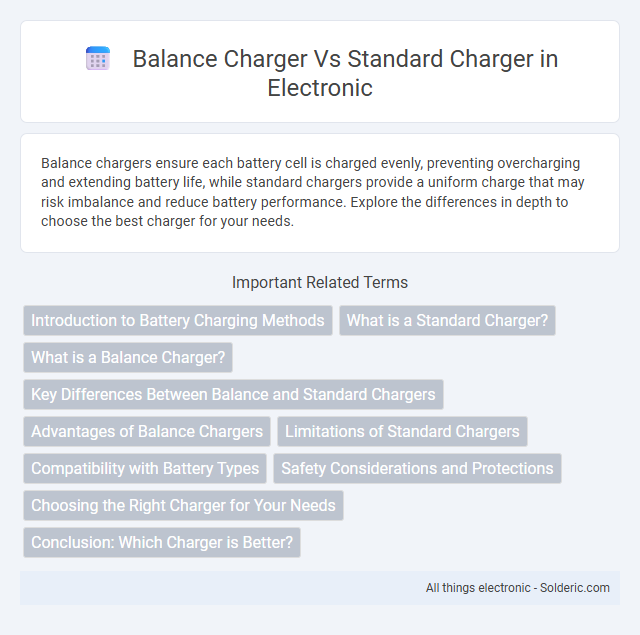Balance chargers ensure each battery cell is charged evenly, preventing overcharging and extending battery life, while standard chargers provide a uniform charge that may risk imbalance and reduce battery performance. Explore the differences in depth to choose the best charger for your needs.
Comparison Table
| Feature | Balance Charger | Standard Charger |
|---|---|---|
| Purpose | Charges each cell individually to ensure balanced voltage | Charges the battery pack as a whole without cell monitoring |
| Battery Types Supported | LiPo, Li-ion, LiFe, NiMH, NiCd | NiMH, NiCd, some Li-ion (basic) |
| Safety | Higher safety with cell monitoring and balancing | Lower safety due to lack of individual cell monitoring |
| Charging Efficiency | Optimizes battery life by preventing overcharge/undercharge | Less efficient; may shorten battery lifespan |
| Cost | Higher initial cost | Lower price |
| Use Case | Recommended for multi-cell rechargeable batteries, RC models, drones | Suitable for simple rechargeable devices with single-cell packs |
Introduction to Battery Charging Methods
Balance chargers optimize battery health by monitoring and charging each cell individually, preventing overcharging and extending battery lifespan. Standard chargers charge battery packs as a whole without cell-level regulation, which can lead to uneven charging and reduced performance over time. Choosing the right charger for Your battery type ensures safer operation and maximizes battery efficiency.
What is a Standard Charger?
A standard charger supplies a fixed voltage or current to recharge batteries without monitoring individual cell voltages, which may lead to uneven charging and potential battery damage over time. In contrast, a balance charger actively manages each cell within a battery pack to ensure all cells are charged equally, enhancing battery life and safety. Your device benefits from the precise charging control offered by balance chargers, especially when using multi-cell lithium-based batteries.
What is a Balance Charger?
A balance charger is a specialized device designed to charge lithium polymer (LiPo) and lithium-ion (Li-ion) batteries while ensuring each cell within the battery pack is charged evenly to prevent damage and maximize performance. Unlike standard chargers, which apply the same charging current to all cells simultaneously, a balance charger monitors and adjusts the voltage of each cell individually, enhancing battery safety and longevity. Using a balance charger for your battery packs helps maintain optimal capacity and reduces the risk of overheating or swelling caused by uneven cell charging.
Key Differences Between Balance and Standard Chargers
Balance chargers regulate the voltage of each individual cell in a lithium battery pack to ensure uniform charging, preventing cell damage and extending battery lifespan. Standard chargers supply a fixed voltage to the entire battery pack without monitoring individual cells, which can lead to overcharging or undercharging certain cells. The precise voltage regulation and cell balancing capability make balance chargers essential for maintaining battery health and safety in multi-cell lithium packs.
Advantages of Balance Chargers
Balance chargers provide precise voltage control by monitoring each cell individually, ensuring battery safety and extending its lifespan. They prevent overcharging and overheating, reducing the risk of damage and improving overall performance. Your batteries maintain optimal capacity and reliability when using a balance charger compared to a standard charger.
Limitations of Standard Chargers
Standard chargers lack the ability to monitor and balance individual cell voltages within lithium polymer (LiPo) or lithium-ion battery packs, which can lead to uneven charging and reduced battery lifespan. They often do not provide critical safety features like overcharge protection or temperature monitoring, increasing the risk of overheating or battery damage. Choosing a balance charger ensures your battery pack maintains optimal health by equalizing cell voltages and preventing these common limitations found in standard chargers.
Compatibility with Battery Types
Balance chargers are specifically designed for lithium polymer (LiPo), lithium iron phosphate (LiFe), and lithium ion (Li-ion) batteries, ensuring each cell within the battery pack is charged equally to prevent damage and prolong battery life. Standard chargers are generally compatible with simpler battery types like nickel-metal hydride (NiMH) and nickel-cadmium (NiCd) but lack the ability to balance cells in multi-cell lithium battery packs. Using a balance charger with compatible lithium batteries enhances safety and performance by monitoring voltage levels across individual cells during charging.
Safety Considerations and Protections
Balance chargers offer enhanced safety features by monitoring and equalizing the voltage of individual battery cells, preventing overcharging, overheating, and potential cell damage. Standard chargers typically lack cell-balancing capabilities, increasing the risk of battery imbalance and safety hazards such as swelling or fire. Advanced protective mechanisms in balance chargers, including overcurrent, short-circuit, and temperature protections, ensure safer charging cycles for lithium-based batteries.
Choosing the Right Charger for Your Needs
Choosing the right charger depends on the type and specifications of your battery; balance chargers optimize cell voltage to ensure safe, efficient charging and prolong battery life. Standard chargers provide a basic charging function without individually monitoring cells, making them suitable for simple or older battery types. Your decision should prioritize battery safety, charging speed, and device compatibility to maximize performance and longevity.
Conclusion: Which Charger is Better?
Balance chargers offer precise voltage control for each battery cell, ensuring longer battery life and enhanced safety compared to standard chargers that provide uniform charging without cell-level monitoring. Your choice should prioritize balance chargers if you use lithium-based batteries, as they prevent overcharging and potential damage. For everyday devices with simpler battery requirements, a standard charger may suffice but lacks the protective benefits of balance chargers.
Balance charger vs standard charger Infographic

 solderic.com
solderic.com